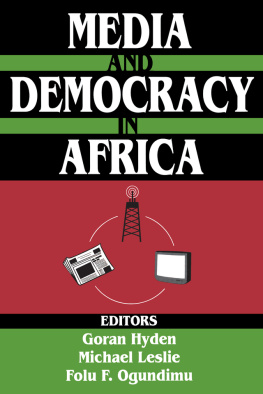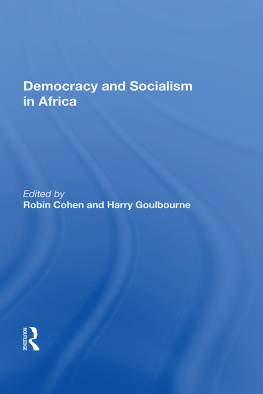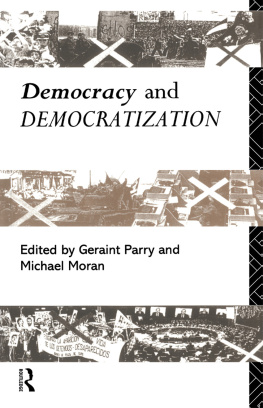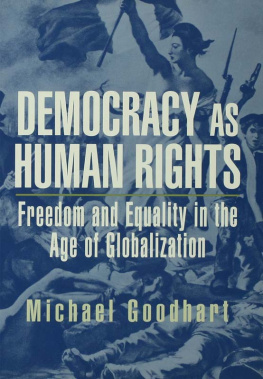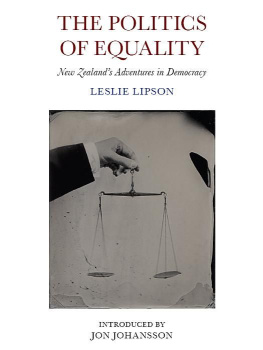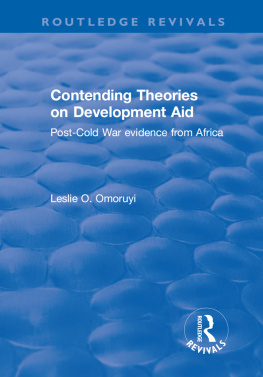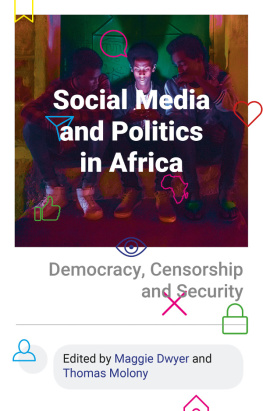MEDIA AND DEMOCRACY IN AFRICA
Media and Democracy in Africa
Goran Hyden, Michael Leslie, and Folu F. Ogundimu
editors
First published 2002 by Transaction Publishers
Published 2017 by Routledge
2 Park Square, Milton Park, Abingdon, Oxon OX14 4RN
711 Third Avenue, New York, NY 10017, USA
Routledge is an imprint of the Taylor & Francis Group, an informa business
Copyright 2002 by Taylor & Francis.
All rights reserved. No part of this book may be reprinted or reproduced or utilised in any form or by any electronic, mechanical, or other means, now known or hereafter invented, including photocopying and recording, or in any information storage or retrieval system, without permission in writing from the publishers.
Notice:
Product or corporate names may be trademarks or registered trademarks, and are used only for identification and explanation without intent to infringe.
Library of Congress Catalog Number: 2002075518
Library of Congress Cataloging-in-Publication Data
Media and democracy in Africa / Goran Hyden, Michael Leslie, and Folu Ogundimu, editors.
p. cm.
"An outgrowth from an international conference organized in March 1997 in the honor of the late Gwendolen Carter who was associated with the Center for African Studies at the University of Florida"Pref.
Includes bibliographical references and index.
ISBN 0-7658-0148-5 (alk. paper)
1. Mass mediaPolitical aspectsAfricaCongresses. 2. DemocracyAfricaCongresses. 3. AfricaPolitics and government1960 Congresses. I. Hydn, Gran, 1938- II. Leslie, Michael. III. Ogundimu, Folu Folarin.
P95.82.A4 M4 2002
302.23'.096dc21
2002075518
ISBN 13: 978-0-7658-0980-3 (pbk)
The purpose of this volume is to provide an updated assessment of the role that the media play in the ongoing process of democratization in sub-Saharan Africa. Much attention has been paid to the reform of formal state institutions, for example, the public service, the judiciary, and the legislature. Similarly, both scholars and activists have shown interest in how associational lifeand with it a civil societymight be enhanced in the countries on the African continent. Much less concern, however, has been directed to the communications media, although they form a vital part of this process. With liberalization of the economy and democratization of the polity, these media, both formal and informal, have come to play a much greater role than they ever have since independence in the early 1960s. Many would argue that the privately owned media have been in the forefront of creating political space for other actors in the public arena and enhancing the extent to which public officials have to consider themselves accountable to the citizenry.
As this volume demonstrates, the media and their operative staff are still far from free of threats and constraints in the pursuit of their profession. Being a journalist or editorial writer is associated with threats of intimidation by government-controlled security agents. Nonetheless, it seems that the media provide a platform for enhancing civil and political rights that voluntary associations do not. They have a particularly important role to play, therefore, in promoting civic consciousness. The decision to concentrate this project on the communications media should be seen in this light.
The media scene in Africa is diverse. It stretches from the welldeveloped and technologically advanced situation in South Africa to the still fledgling media operations that characterize most countries in sub-Saharan Africa. In these places, print media as well as radio and television are just beginning to take their place in society and typically do so using a simple and often outdated technology. The situation in a single country, however, also varies. Modern information technology is beginning to make headway in sub-Saharan Africa and this volume pays attention to how I.T. is being conceived by its users. Informal media also play an important role, especially since the tendency among public officials to keep things public secret and confidential encourages people to spread rumors about the reasons for particular decisions or behaviors of leaders. The radio trottoir or rumor millthat can be found in virtually every capital city in Africa is evidence of the extent to which state officials continue to direct public affairs in an autocratic and bureaucratic manner.
This project has also been designed so as to provide a longitudinal perspective on the evolution of the African media. We are trying to place the present in the context of the past, including both colonial and post-colonial experiences. For example, we examine the role that the colonial experience has played in justifying regulation and control of the media after independence. We also look at how the current efforts in the 1990s to use the media to bring about democracy and development compare with those in the early years of political independence, when modernization theory dominated the minds of analysts and practitioners alike.
This volume is an outgrowth from an international conference organized in March 1997 in the honor of the late Gwendolen Carter who was associated with the Center for African Studies at the University of Florida during her last years of active professional life. The meeting brought together scholars and professional journalists from Africa and the United States. The best papers from that conference constitute the substance of this volume. Each paper has been revised and updated since the conference, taking into consideration points made in the discussions as well as changes that have taken place in the media scene since then. Two papers have been solicited after the conference to ensure a greater coherence in the volume. We believe that it addresses issues that are of interest and relevance to academics as well as provides thoughtful analysis of the current trends with regard to media development in Africa. Because it is focused on the role of the media in democratization, it is of interest to a larger constituency of scholars and analysts concerned with the constraints and opportunities for political reform on the continent.
Finally, we wish to express our gratitude to the Ford Foundation and its South Africa office that provided partial funding for the conference and to the College of Journalism and Communications, the Center for African Studies and the Graduate School at the University of Florida, all of which helped finance the rest of the expenses associated with the conference and the subsequent editing of this volume. Finally, we express out thanks to Ms. Caroline Leon at the Center for African Studies who assisted us in putting our manuscript in a form ready for consideration by the publisher.
Goran Hyden, Michael Leslie, and Folu Ogundimu
August, 2001
1
Communications and Democratization in Africa
Goran Hyden and Michael Leslie
Introduction
There is a rapidly growing literature on democratization in Africa but very little of it deals with the role that communications, or the media, play. This is all the more surprising given that social movements and other voluntary associations, that have played a significant role in democratizing countries in regions such as Latin America and Eastern Europe, have been quite weak in African countries. Therefore, our assumption is that media have been relatively more influential in shaping the emerging, but still fledgling, democratic culture in Africa.


